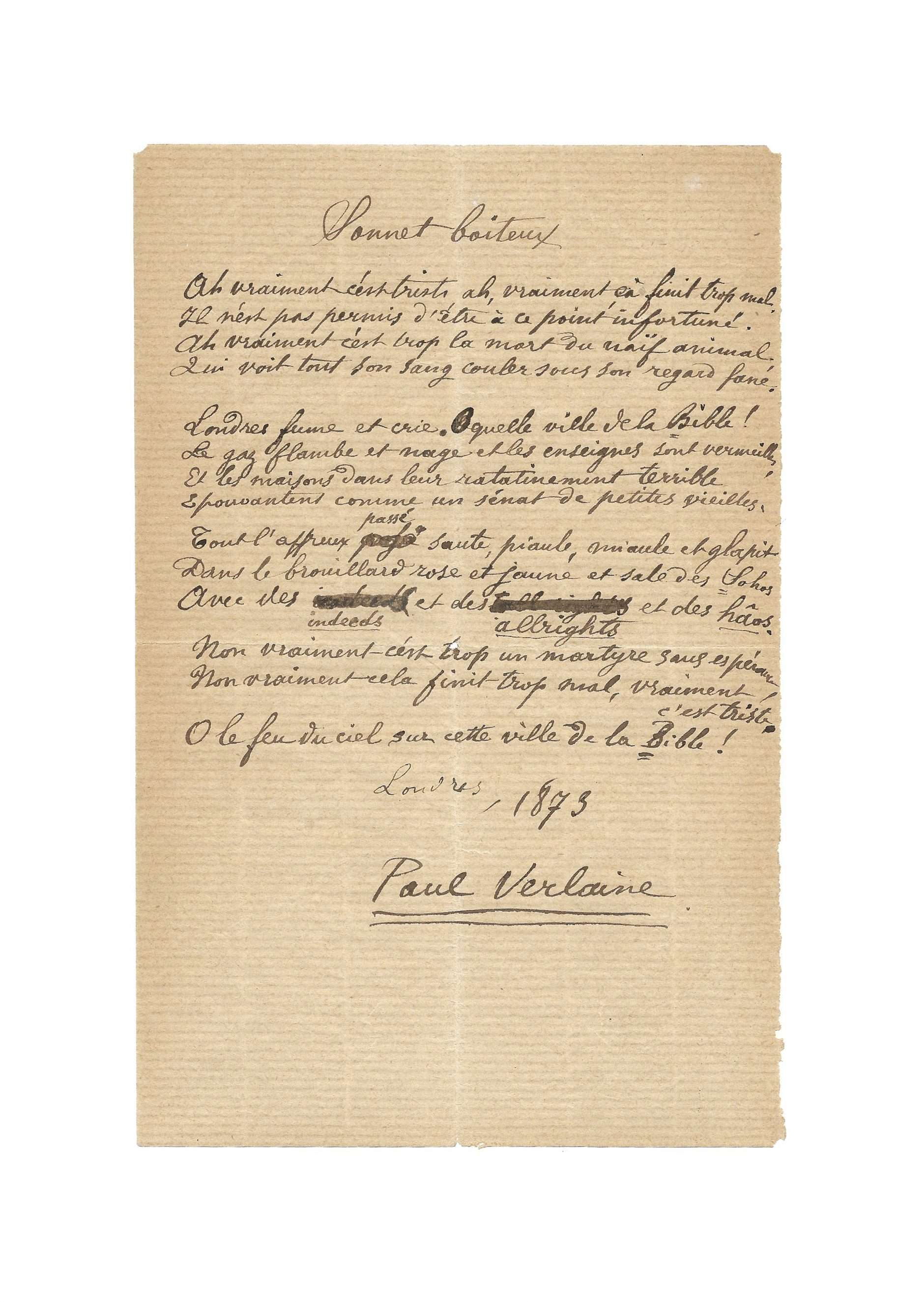VERLAINE, Paul (1844-1896)
Autograph poem signed « Paul Verlaine »
London, 1873, 1 p. in-8°, on laid paper
« O le feu du ciel sur cette ville de la Bible ! »
Fact sheet
VERLAINE, Paul (1844-1896)
Autograph poem signed « Paul Verlaine »
London, 1873, 1 p. in-8°, on laid paper
Fold marks, slightly irregular right hand margin, pinhole on central fold
A highly significant poem, evoking the chaotic and miserable escape to London with Arthur Rimbaud
Verlaine makes an innovation from the traditional sonnet and does his first attempt in verses of thirteen syllables
« Sonnet boiteux
Ah vraiment c’est triste, ah, vraiment ça finit trop mal.
Il n’est pas permis d’être à ce point infortuné.
Ah ! vraiment c’est trop la mort du naïf animal
Qui voit tout son sang couler sous son regard fané.
Londres fume et crie. O quelle ville de la Bible !
Le gaz flambe et nage et les enseignes sont vermeilles.
Et les maisons dans leur ratatinement terrible
Épouvantent comme un sénat de petites vieilles.
Tout l’affreux passé saute, piaule, miaule et glapit
Dans le brouillard rose et jaune et sale des Sohos
Avec des indeeds et des allrights et des hâos.
Non vraiment – c’est trop un martyre sans espérance,
Non vraiment – cela finit trop mal, vraiment c’est triste :
O le feu du ciel sur cette ville de la Bible !
Londres, 1873
Paul Verlaine »
This sonnet innovates both in its formulation and in the use of thirteen-syllable verses. It marks for Verlaine’s poetry a breakthrough with the classical sonnet and new metric perspectives. The period is for him conducive to these new experiments, alongside Rimbaud who, behind these verses, appears as a spectral figure; so strong was his aesthetic influence on Verlaine, and vice versa. There are two references to the city of Sodom, this “city of the Bible”, whose people suffered the wrath of an incendiary God. The evocation of the “Sohos” also refers to this famous district of London which, in 1872-1873, was well known for its free customs and prostitution, where many exiled Communards lived and which the two poets knew well.
Although it is impossible to formally date this sonnet, there is every reason to believe that Verlaine composed it in the prison of Mons in the autumn of 1873. The poet reveals here a great moral suffering, consumed by impurity, blasphemy and forbidden pleasures with his companion in misfortune.
Three manuscripts of this poem are known to date, with several variations. The first, attached to a letter to Edmond Lepelletier of October 1873, is entitled Hiver, and closes the Mon Almanach series for 1874 (now at the Bibliothèque littéraire Jacques Doucet). The second, which is a net, appears in Cellulairement, a collection composed at the prison of Mons between October 1873 and January 1875. Our manuscript, the third, was used for the first publication of the sonnet in La Nouvelle Lune of February 11, 1883. This poem then appears in Jadis et naguère, published by Vanier in November 1884. It was also at this time that Verlaine gave it its definitive title: Sonnet boiteux. Verlaine will add the dedication “À Ernest Delahaye” at the last moment, directly on the cut of La Nouvelle Lune prepared for the printing of Jadis et naguère (Bibliothèque littéraire Jacques Doucet).
We attach:
An autograph letter signed by Verlaine to Philomène Boudin, known as Esther
London, [25 November 1893], 3 p. in-8°
The poet writes his mistress a tender letter from London while alluding to his tumultuous trip to the same city twenty years earlier, alongside Arthur Rimbaud, contributing to the break with his first wife, Mathilde Mauté.
“Don’t fear women. Besides, London brought me bad luck 20 years ago in this respect.”
(Bibliography: Correspondence of Paul Verlaine – Ad. Van Bever, Messein, vol. II p. 307)
Bibliography:
Œuvres poétiques complètes, éd. Y.-G. Le Dantec, révisée par J. Borel, Bibliothèque de la Pléiade, 1962, p. 323-324 ;
Jadis et naguère, édition critique établie par Olivier Bivort, Le Livre de poche classique, 2009, p. 73, 270-271
Provenance:
A. Joly collection,
Then André Lebreton collection (Drouot, 9 mai 1938),
Then Mme Prat collection
